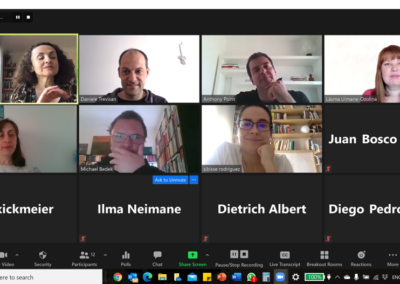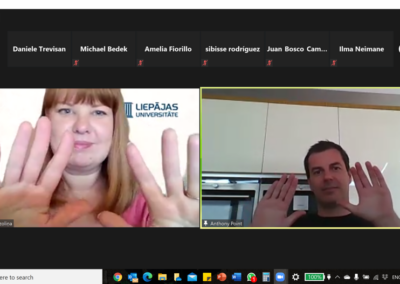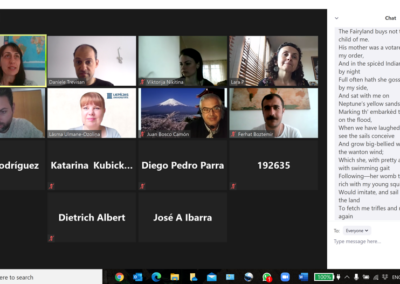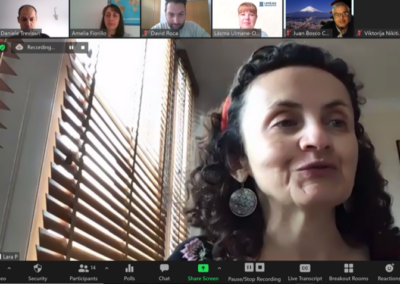Training about knowledge visualization, knowledge sharing.
Graz, Austria – 16th December – 18th December 2020 (online)
Best practice exchange in the field of professional development of adult educators.
London (UK) April 27th – April 29th 2021
1. Topic
Using theatre to foster inclusion and integration.
2. Description
|
The aim of this workshop was to give participants an overview of how theatre can be used in adult education, especially in contexts with disadvantaged groups such as migrants, asylum seekers and refugees. Through the workshop participants explored a different set of techniques ranging from warm up exercises, improvisation, mirroring, space and time, storytelling, acting, and others, mainly used in contexts to help self expression and boost confidence. During the workshop we looked at different authors such as: – Augusto Boal – Anne Bogart – Jerzy Grotowsky – Sanford Meisner – Peter Brooq – Jacques Lecoq |
3. Objectives
|
To learn how to use theatre in education of adults especially from disadvantaged backgrounds, to favour self expression, boost confidence, and improve learning outcomes. To learn specific theatre techniques that can be used in formal and informal learning contexts |
4. Results
|
Tangible: acquisition of new methods and techniques Intangible: realising the potential that theatre can have if used in adult education contexts, to support learning processes, help self expression and improve confidence |
5. Downloads
|
AUGUSTO BOAL Books: The Rainbow of Desire Games for Actors and non actors Theatre of the Oppressed
Mirror https://youtu.be/r1GokLYbG7c (with words) https://youtu.be/cNe-QxsMvoM (with body)
Meet and transform gesture (you can add dialogue)
The machine ANNE BOGART Viewpoints techniques can be easily adapted for community learners. They are particularly good for facilitators working with migrants, refugees, people with learning disability etc. It’s a totally physical approach to ensemble building and team work. ALL exercises can be simplified to make them less intense. What counts is the TEAM BUILDING and working as a group
JERZY GROTOWSKY Towards a poor theatre “Poor Theatre” places emphasis on the physical skill of the performer and uses props for transformation into other objects, sometimes of great significance. The focus is on Space & Actor-Audience Relationship ● traditional theatre spaces are ignored in preference for rooms and buildings ● little need for a traditional stage dedicated to acting or a purpose-built theatre ● Intense exploration of the relationship between participant and spectator ● his aim was to eliminate the division between actor and audience, creating a communion between the two “Grotowski’s method is positively valued by pre-adolescents and improves acceptance towards the others” by Stella Conte, Gioia Cambiaggio, Ghiani Carla, and Buffa Margherita Four elements breathing Breathing and speaking ENSEMBLE GAMES FOR LANGUAGE STIMULATION Five things, count to 21, firing line, categories (you can skip the first exercise in the video. This is great for language and people can compete ) Improv with made up words Improv Warmups and exercised https://www.youtube.com/watch?v=CIHnGvbiWU8 SANFORD MEISNER On Acting The Power of Relationship: Sanford Meisner and Psychotherapy http://kc.perform.ink/2017/04/power-relationship-sanford-meisner-psychotherapy/ But what does it all mean for a non-actor? By Jo Adentuji Storytelling More articles and resources PETER BROOK The Empty Space Making Meaningful Theater in the Empty Space Joseph M. Shosh and Jennifer A. Wescoe The English Journal Vol. 96, No. 5 (May, 2007), pp. 42-47 (6 pages) Published By: National Council of Teachers of English https://www.jstor.org/stable/30046709?seq=1 JACQUES LECOQ The moving body Seven States of Tension https://dramaresource.com/seven-levels-of-tension/ https://www.youtube.com/watch?v=5AdzFN8qNlo&t=13s ACTIONING https://www.nickhernbooks.co.uk/asset/3265?cmsAsset=1
|
1. Topic
|
Using photography and video making in adult education |
2. Description
|
This workshop provides an overview of the main concepts related with the use of photography and video making in adult education, the benefits that may stem from using them, as well as giving a quick look at the main technical aspects related to both disciplines. |
3. Objectives
|
To look at how photography and video making can be integrated in formal and informal adult education contexts. To look at technical aspects related to how to: use of devices, composition, editing, script writing, storytelling, etc. |
4. Results
|
Tangible: acquisition of new methods and techniques. Intangible: realising the potential that photography and video making can have if used in adult education contexts, to support learning processes, help self expression and improve confidence. |
5. Downloads
|
Full presentation: https://audience.ahaslides.com/rwmdjpx9hx Other relevant links: http://mediacollege.com – Free resource for film and digital media production DSLR Camera Shutter/Aperture/Iso: https://www.youtube.com/watch?v=9DQXlRpY2qc Video tutorial for beginners: https://www.youtube.com/watch?v=_Ek7Tyt17Yg Determining video marketing objectives: https://animoto.com/blog/business/video-marketing-objectives
|
Photo Gallery
Photos from virtual seminar.




